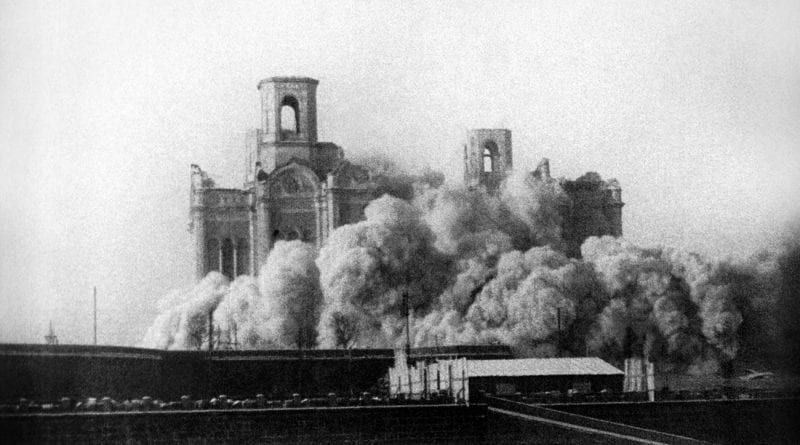Why the Soviet Union failed to eradicate religion
Source: Catholic Herald
Communist atheism failed to address the search for personal meaning in life
There is a very affecting scene at the end of Turgenev’s mid-nineteenth century novel, Fathers and Sons, when Bazarov, the resolute young atheist who dominates the book, is dying of typhus and his father begs him to receive the Last Rites of the Orthodox Church in order to “give your mother and
This novel and its undercurrents came to my mind as I read A Sacred Space is Never Empty: a History of Soviet Atheism by Victoria Smolkin (Princeton University Press). The book’s title comes from a Russian proverb; as such, it is a constant ironic sub-text to Smolkin’s argument: that despite all its efforts, sometimes violent and often ludicrous, the Communist Party was unable to eradicate religious belief during the seventy years that it dominated the USSR.
The book should be read by anyone who wants to understand the internal contradictions of Communism and why the ideology behind it could never bridge the gulf that existed between it and the Soviet people. Smolkin examines every phase of the state’s struggle to eradicate religious belief which unaccountably and exasperatingly refused to “wither away” as Marxist-Leninist theory so confidently believed at the outset.
It is a story that is tragic and comic by turns, beginning with the Bolsheviks’ militant atheism and its savage suppression of the Church; through Stalin’s deliberate decision to allow Orthodoxy to function again in 1943 as a way of encouraging patriotism during the war; thence to an examination of Kruschev’s renewed hostility and promotion of “scientific atheism”, Brezhnev’s era with its clumsy attempts to create “spiritual atheism”, concluding with Gorbachev’s momentous decision, with its unforeseen consequences, to make the celebration of Russia’s thousand years of Christianity – from 988 to 1988 – a national event, not merely a religious one.
Smolkin, who is assistant professor of history at Wesleyan University in the US, writes as a historian, describing the activities of the “League of the Militant Godless”, Stalin’s Great Terror of 1937, the cult of science, the state’s reluctant recognition that ordinary people yearned for solemn rituals to mark birth, marriage and death and not merely bureaucratic registration, and much else to absorb the general reader. For Christians her book will have a particular interest and poignancy: that despite a long campaign against faith in Christ, the Lord of history, Christianity will not die, despite the Marxist “logic of history” predicting that it will and should.
Turgenev’s novel of 1862 pitted Bazarov’s scientific atheism against the old order. In 1967, just over a century later, the debate had come full circle when a question arose at an atheism seminar: should a Communist party member fulfil the dying wish of his believing father or mother to be “buried with a priest”? The official who posed the question concluded, “I think he should”. It was an implicit and belated recognition that Soviet atheism had failed to address the search for personal meaning in life as well as the “need for solace in the face of suffering.”





